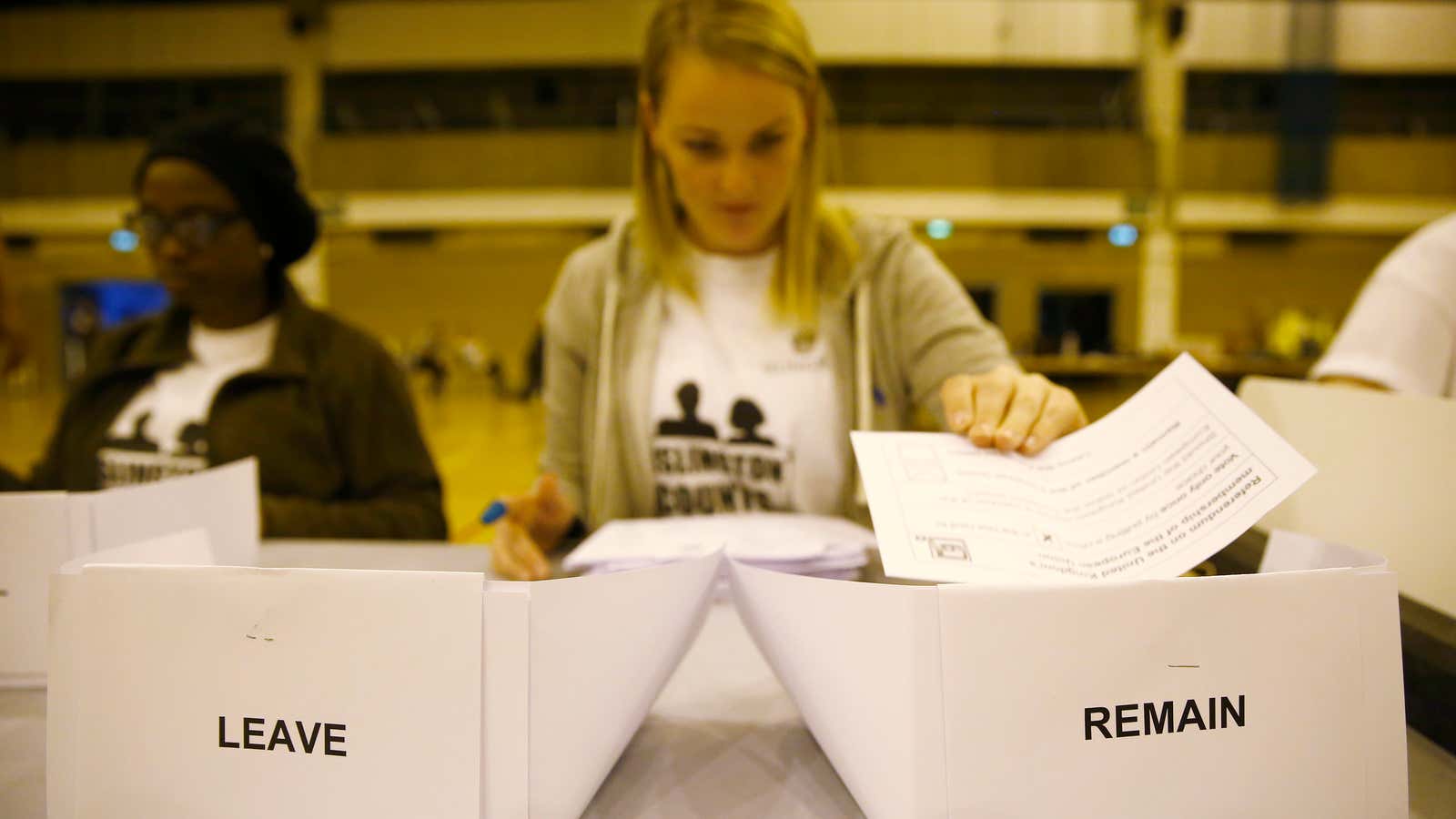The Brexit referendum will probably be the defining political event in the UK over the next few decades. But to know whether leaving or remaining is actually a good idea requires tremendous social scientific knowledge–knowledge that most Britons lack. The day after the referendum, in the UK, there was a sharp spike in Google searches asking exactly what the EU is and what leaving it will do. This suggests many Britons voted first and did their homework second. Already, many UK voters express regret.
Over the past few years, we’ve see the rise of such populist movements across the West, driven by angry, resentful, low-information voters. Brexit is what happens when people fail to regard voting as a morally charged act. Most voters think that because voting is their right, they should feel free to vote however they want, without having to put in the hard work to make a wise decision. That’s a mistake.
How we vote matters. Many factors, including party politics, bureaucratic prerogative, lobbyist influence, and court decisions, help shape and determine political outcomes. Still, in the end, what voters want makes a large difference. If citizens vote unwisely, their country (or the world) may suffer from deep recessions, unnecessary wars, destructive economic policies, or overly punitive criminal systems. They may, in a fit of resentment toward Europeans and immigrants, condemn their children to less bright futures.
Voting is not like choosing dinner from a menu. When an individual picks a curry from a food truck, she chooses only for herself. If she makes a bad choice, only she bears the consequences.
But the individual act of voting impacts everyone. When the majority makes a bad choice, everyone suffers, including dissenting voters, foreign residents, foreigners living abroad, and children who are ineligible to vote.
The ethics of voting are an ethics of care. Consider, as an analogy, the physician-patient relationship. The patient justifiably puts trust in his physician, and is uniquely vulnerable to the physician’s decisions. So the physician has a duty to promote the patient’s interests rather than her own.
The physician also has a duty to decide on a course of treatment in a rational way. She ought to gather the facts about the patient’s symptoms, assess those facts scientifically, and offer a prescription using the best available medical theories. If the doctor chose out of fancy, ignorance, or without any background medical knowledge, she would be acting immorally.
The average voter is a quite like an incompetent doctor. Decades of research on voter behavior find that most voters in most modern democracies are deeply ignorant, not only of the social scientific theories needed to evaluate the facts, but of basic political facts themselves. They form coalitions and decide how to vote not on the basis of rational deliberation, but out of whim and fury. They are more like witch doctors than good doctors. When we ask UK voters to decide on Brexit, that’s like asking people who are failing medical school for advice about how to cure cancer.
Voters would seem have an excuse. A physician’s individual decisions make a huge difference. But individual votes make no difference. Of course, how the UK electorate as a whole votes matters a great deal. But the chances that an individual UK voter would change the outcome of the referendum were roughly on par with her chances of winning EuroMillions.
This explains why voters are so ignorant and irrational. They realize their individual votes make no difference, and so they have little incentive to acquire information or to reason about politics in a rational way.
But this excuse—though it gets the mathematics of voting right—has little moral force. Consider another analogy: Suppose you come across a neo-Nazi gang spraying anti-Semitic graffiti on a public building. Suppose you can’t stop them; no matter what you do, they will deface the wall. Now suppose they offer you an opportunity to join them in drawing swastikas. From a moral point of view, you should turn them down, even though your individual decision to join in or walk way makes no difference in the outcome.
Or suppose that a 100-person firing squad was about to execute an innocent person. Suppose again that you cannot stop them. They hand you a rifle and offer to let you shoot with them. Again, taking the shot or walking way makes no difference—the innocent person will die either way. From a moral point of view, however, you should not join in.
The same logic applies to the ethics of voting. Bad voters in the Brexit referendum are like people who took the 101st shot or decided to practice their graffiti skills. As individuals, they make no difference, but the right thing would have been to keep their hands clean.
If voters just want to express themselves, there are safer alternatives. They could write poems, wave flags, or burn effigies. Casting a vote means exercising political power over others. It carries with it great responsibility, yet few voters take their own decisions seriously.
